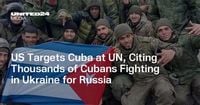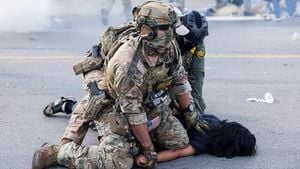On October 2, 2025, the Trump administration took a decisive step in its ongoing campaign against Cuba, instructing American diplomats worldwide to rally opposition to a United Nations resolution calling for an end to the decades-old U.S. embargo on the island nation. According to an internal State Department cable obtained by Reuters and other outlets, the U.S. is now citing Havana’s alleged involvement in Russia’s war in Ukraine as a central argument in its diplomatic push, a move that has added new urgency and controversy to an annual debate at the U.N.
The cable, which was sent to dozens of U.S. embassies and missions, directed diplomats to tell their host governments that the Cuban regime is "actively supporting Russia’s invasion of Ukraine," with as many as 1,000 to 5,000 Cubans reportedly fighting alongside Russian forces. "After North Korea, Cuba is the largest contributor of foreign troops to Russia’s aggression," the cable stated, according to Reuters. The State Department spokesperson, responding to media inquiries, confirmed Washington’s awareness of such reports but declined to provide further details on the alleged Cuban fighters.
The annual U.N. resolution calling for the lifting of the U.S. embargo on Cuba has been a diplomatic fixture since 1992, passing each year by overwhelming margins. In the most recent vote, 187 countries supported the measure, with only the United States and Israel voting against it, while Moldova abstained. Despite the non-binding nature of the resolution, it carries significant political weight, serving as a barometer of global opinion on U.S. policy toward Cuba.
This year, however, the stakes appear higher. The Trump administration has doubled down on its hardline stance since returning to office in January, reinstating Cuba on the U.S. list of state sponsors of terrorism, tightening financial and travel restrictions, and sanctioning third-country nationals who host Cuban doctors. The administration’s approach represents a marked departure from previous attempts at engagement, and it has drawn both criticism and support from various quarters.
According to the State Department cable, U.S. diplomats were told to argue that the U.N. resolution “incorrectly” blames the United States for Cuba’s economic woes, which Washington attributes instead to Havana’s "own corruption and incompetence." The cable emphasized that the objective is to reduce the number of "yes" votes supporting the resolution. "‘No’ votes are preferred but abstentions or absent/not voting are also useful," the document noted, highlighting a tactical shift from simply defending the embargo to actively seeking to weaken international support for lifting it.
The State Department spokesperson was unequivocal in defending the administration’s position, telling Reuters: "The Trump Administration will not remain on the sidelines or support an illegitimate regime that undermines our national security interests in our region." This sentiment was echoed throughout the cable, which provided nearly two dozen talking points for American diplomats. Among them were accusations that Cuba is squandering its limited resources, denying basic human rights to its people, and posing a threat to international peace by supporting Russia’s military campaign in Ukraine.
The Cuban government, for its part, has long blamed the U.S. embargo—imposed after Fidel Castro’s 1959 revolution—for the country’s chronic shortages of food, medicine, and fuel, as well as a broader economic collapse marked by inflation and crumbling infrastructure. Officials in Havana did not immediately respond to requests for comment regarding the latest U.S. allegations. However, Cuban Foreign Minister Bruno Rodriguez, speaking at the U.N. on October 1, called on the international body to prevent the United States from starting a war in the region. He dismissed U.S. claims of fighting drug trafficking as a "crude and ridiculous pretext" for aggression, a statement that underscores the deep mistrust and mutual recriminations that continue to define U.S.-Cuban relations.
Meanwhile, the issue of Cuban involvement in the Ukraine conflict has become a growing concern for both Washington and Kyiv. Ukrainian officials have recently warned U.S. lawmakers about what they describe as Russia’s increasing recruitment of Cuban mercenaries to fight on the front lines. Social media and open-source intelligence reports have surfaced, including videos purportedly showing Cuban fighters in Ukraine, though the exact scale and nature of this involvement remain difficult to independently verify. The State Department, for its part, maintains that "the Cuban regime has failed to protect its citizens from being used as pawns in the Russia-Ukraine war."
The diplomatic campaign against the U.N. resolution is part of a broader strategy that also targets Cuba’s regional alliances, particularly its close relationship with Venezuela. Tensions between Washington and Caracas have been mounting, with the U.S. military recently carrying out strikes in the Caribbean on boats originating from Venezuela that it claims were involved in drug trafficking. The latest such strike occurred on the Friday before October 6, 2025, adding another layer of complexity to an already volatile regional dynamic.
For years, U.S. efforts to sway votes on the U.N. resolution have focused on the legality of the embargo, the existence of exceptions for food and medicine, and Cuba’s human rights record. Yet, as the State Department cable acknowledged, none of these arguments have succeeded in shifting the overwhelming international consensus against the embargo. This year, by invoking Cuba’s alleged military support for Russia, the administration hopes to present a new and more compelling rationale for maintaining—and even tightening—the embargo.
Still, the embargo remains firmly in place, and only the U.S. Congress has the authority to lift it. For ordinary Cubans, the consequences are all too real: shortages of basic goods, collapsing infrastructure, and runaway inflation have combined to create the worst economic crisis on the island in decades. While the Cuban government insists that U.S. sanctions are to blame, Washington maintains that Havana’s own policies are the root cause of the country’s suffering.
As the next U.N. vote approaches, the diplomatic battle lines are clearly drawn. The United States is pressing its case harder than ever, linking Cuba’s fate to the broader geopolitical struggle in Ukraine and the ongoing contest for influence in the Western Hemisphere. Whether this new strategy will sway enough countries to change the outcome at the U.N. remains to be seen, but one thing is certain: the debate over Cuba’s future, and America’s role in it, is far from over.
The latest developments have injected fresh urgency and controversy into a longstanding dispute, with both sides digging in and the international community once again called upon to take a stand. As diplomats prepare for another round of high-stakes negotiations, the world will be watching to see if the U.S. can make headway on an issue that has defied resolution for more than six decades.




